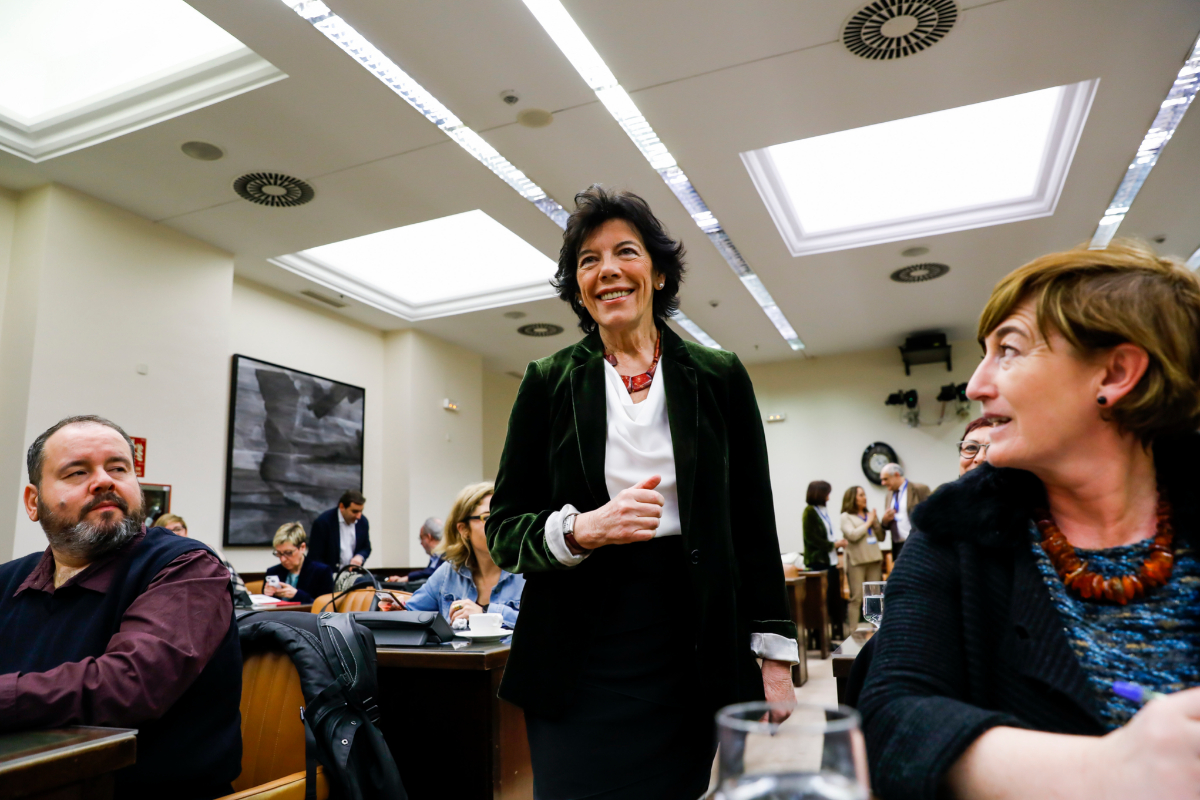- New norm. The 'Celaá law' will allow students to be distributed by schools arranged for "socio-economic reasons"
- Analysis: This is the 'Celaá law'
- The experts. "The 'Celaá law' renounces meritocracy"
Last week, the Minister of Education, Isabel Celaá, expressed her intention that her educational reform be "the first law of the Government in this legislature." This Tuesday, the Council of Ministers will approve, as planned, the one known as the Celaá law . The LOMLOE or Organic Law for the Reform of the Organic Law of Education, as it is officially called, will replace the Lomce or Wert Law , approved by the PP only seven years ago, 2013. It is the eighth educational law of democracy.
Within the round of contacts that the minister is making with the main representatives of the education sector on the occasion of the reform, this Monday she received the national president of education of the CSIF union, Mario Gutiérrez , who transferred to Celaá the fear of the sector that the law has as short life as the previous ones.
"We have asked the minister to seek the greatest possible consensus within the parliamentary arch to avoid the failure that for us supposes that every time the government changes, the organic law changes," Gutierrez told EL MUNDO after the meeting.
The same skepticism about the longevity of the Celaá law manifests Nicolás Fernández Guisado , president of the association of Anpe teaching professionals . "It has no consensus and we would be faced with a change of government to re-delegise and legislate," says Fernández Guisado, who believes that the reform has been elaborated in a "hasty" way.
"It was done in the previous legislature, which was a transitional legislature. It was intended as repealing the Lomce and putting the new law in calzon. This could be justified in a short legislature, but now that we are in a new legislature our criterion is that mechanisms should be put in place to ensure a prior agreement, with teachers and the educational community, to carry out a profound and global reform of education in Spain. This is not a new law, it is the reform of the previous ", Add.
A reform that obviates fundamental problems
From the Anpe they describe the reform as "partial" and although they agree with certain changes - "related to academic measures, the curricular design, the structure of the cycles and the operation of the centers" - disapprove others, such as the possibility of obtaining the baccalaureate degree having a pending subject.
For its part, the CSIF believes that educational reform has long passed through fundamental problems, "such as youth unemployment, school dropout, repetition rate, differences between autonomous communities," says Mario Gutiérrez.
It will be the second time that the Celaá law passes through the Congress of Ministers. The Government already approved it on February 15, 2019, the same day that the electoral advance was announced, which truncated its parliamentary process. Then more than 500 amendments to the text were submitted, of which 121 were approved.
This Monday, the vice secretary of Social Policy of the PP, Cuca Gamarra , called on the president of the Government, Pedro Sánchez, to withdraw the educational reform to repeal the Lomce. In the press conference after the popular leadership committee, Gamarra declared that the Government is not on the "right path" to "impose" this reform that is done "on its back" in the middle of parliamentary representation and Spanish society .
"They are in time to withdraw that bill and that we sit with the entire educational community to work," he said, after ensuring that the PP had "the outstretched hand" to reach an agreement based on a decalogue of points "by educational freedom. "
This decalogue includes measures such as a "public and state assessment" in the Baccalaureate that is binding or Spanish as a vehicle language, as well as an MIR for teachers and the defense of "concerted, special education and in the rural environment" .
According to the criteria of The Trust Project
Know more- LOMCE
- PP
- Pedro Sanchez
- Isabel Celaá
- Spain
- Education
Politics Married accuses Sánchez: "He has broken the constitutional consensus" and "has been outlawed"
Control session Pedro Sánchez faces the table with the Generalitat "with the best of spirits" and for the dialogue "to bear fruit"
Governance Montero surprises by an increase in the expenditure ceiling for 2021 on the path approved by Parliament

